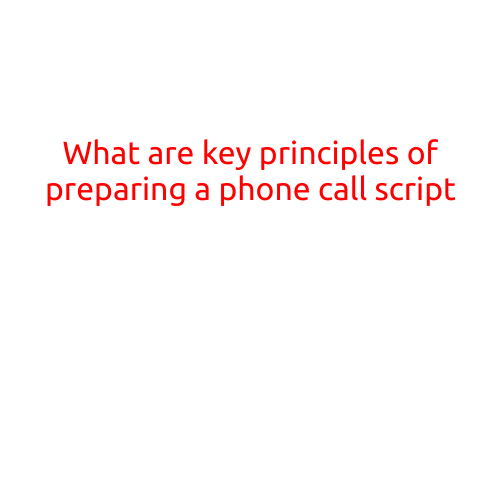
What are Key Principles of Preparing a Phone Call Script?
When it comes to making successful phone calls, preparation is key. A well-crafted phone call script can help you stay on track, ensure you cover all important points, and make a positive impression on your caller. But what are the key principles of preparing a phone call script?
1. Know Your Objective
Before you start writing your script, define the purpose of the call. What do you want to achieve? Do you need to schedule an appointment, answer a customer’s question, or close a deal? Knowing your objective will help you focus on the most important information to convey.
2. Identify Your Audience
Who is your target audience? Are you calling a friend, family member, or business contact? Understanding your audience’s needs, interests, and level of understanding will help you tailor your language and approach.
3. Keep it Concise
Avoid using jargon or overly technical language. Keep your script concise and to the point. Use simple, clear language that your caller can easily understand.
4. Break it Down
Break your script into sections or segments. This will help you stay organized and ensure you cover all essential points. Common segments include introduction, problem statement, solution, and conclusion.
5. Use a Structured Format
Use a structured format for your script. This can include:
- Introduction: Start with a brief introduction, stating your name and purpose of the call.
- Context: Provide context for the call, such as background information or a summary of the conversation.
- Problem Statement: Clearly state the problem or issue you’re there to discuss.
- Solution: Offer a solution or suggestion to address the problem.
- Conclusion: Summarize the key points discussed and reiterate your next steps.
6. Anticipate Objections
Anticipate potential objections or concerns your caller may have. Prepare responses to these concerns to address them and move the conversation forward.
7. Practice, Practice, Practice
Practice your script before making the call. Read your script aloud to ensure it sounds natural and conversational. Practice responding to potential objections and scenarios that may arise.
8. Be Flexible
Be prepared to adjust your script as needed. Things don’t always go according to plan, and being flexible will help you adapt to unexpected twists and turns.
9. Use Visual Aids
Consider using visual aids, such as notes or a laptop, to refer to during the call. This can help you stay on track and ensure you don’t forget important details.
10. Review and Refine
After making the call, review and refine your script. Take note of what worked well and what areas need improvement. Use this feedback to refine your script for future calls.
By following these key principles, you can create an effective phone call script that helps you achieve your objectives and make a positive impact on your callers. Remember to stay flexible, anticipate potential objections, and practice, practice, practice to ensure a successful outcome.





